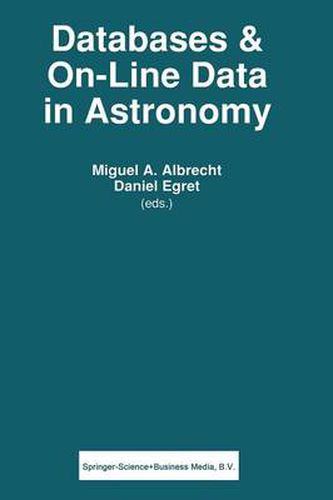Readings Newsletter
Become a Readings Member to make your shopping experience even easier.
Sign in or sign up for free!
You’re not far away from qualifying for FREE standard shipping within Australia
You’ve qualified for FREE standard shipping within Australia
The cart is loading…






This title is printed to order. This book may have been self-published. If so, we cannot guarantee the quality of the content. In the main most books will have gone through the editing process however some may not. We therefore suggest that you be aware of this before ordering this book. If in doubt check either the author or publisher’s details as we are unable to accept any returns unless they are faulty. Please contact us if you have any questions.
Data archiving has, for many years, been the most disregarded aspect of all data systems. The increase in numbers of telescopes, both groundbased and space-borne, and the increase in efficiency of detectors have generated overwhelming amounts of data. Much of these data were and are not used on short timescales and (should) have been archived, where they can be used later and/or by others. Archiving is essential. Objects can change in the course of time. New technological or scientific developments might require observing objects again. The cost-benefit ratio will become more and more important when considering the allocation of telescope time. The retrieval of “old’ data can then be crucial.
At present there are a number of data collections and data retrieval systems. This book includes a series of clear and up-to-date descriptions of many important available data systems.
For professional astronomers, librarians and computer engineers.
$9.00 standard shipping within Australia
FREE standard shipping within Australia for orders over $100.00
Express & International shipping calculated at checkout
This title is printed to order. This book may have been self-published. If so, we cannot guarantee the quality of the content. In the main most books will have gone through the editing process however some may not. We therefore suggest that you be aware of this before ordering this book. If in doubt check either the author or publisher’s details as we are unable to accept any returns unless they are faulty. Please contact us if you have any questions.
Data archiving has, for many years, been the most disregarded aspect of all data systems. The increase in numbers of telescopes, both groundbased and space-borne, and the increase in efficiency of detectors have generated overwhelming amounts of data. Much of these data were and are not used on short timescales and (should) have been archived, where they can be used later and/or by others. Archiving is essential. Objects can change in the course of time. New technological or scientific developments might require observing objects again. The cost-benefit ratio will become more and more important when considering the allocation of telescope time. The retrieval of “old’ data can then be crucial.
At present there are a number of data collections and data retrieval systems. This book includes a series of clear and up-to-date descriptions of many important available data systems.
For professional astronomers, librarians and computer engineers.